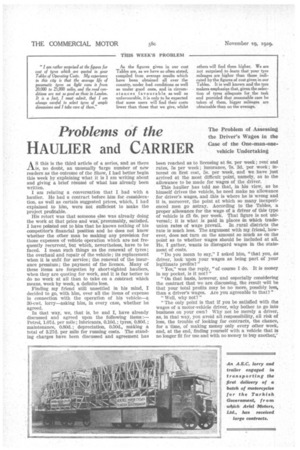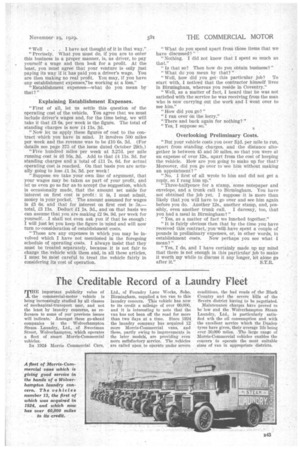Problems of the
Page 76

Page 77

If you've noticed an error in this article please click here to report it so we can fix it.
HAULIER and CARRIER A S this is the third article of a series, and as there no doubt, an unusually large number of new readers as the outcome of the Show, I had better begin this week by explaining what it is I am writing about and giving a brief résumé of what has already been written.
I am relating a conversation that I had with a haulier. He had a contract before him for consideration, as well as certain suggested prices, which, I had explained to him, were not sufficient to make the project profitable.
His retort was that someone else was already doing the work at that price and waKpresumably, satisfied. I have Milted out to him that he knows nothing of his competitor's financial position and he does not know whether the other man be making any provision for those expenses of vehicle operation which are not frequently recurrent, but which, nevertheless, have to he faced. I mean such things as the renewal of tyres; the overhaul and repair of the vehicle; its replacement when it is unfit for service; the renewal of the insurance premium; the payment of the licence. Many of these items are forgotten by short-sighted hauliers, when they are quoting for work, and it is far better to do no work at all than to take on a contract which means, week by week, a definite loss. Finding my friend still unsettled in his mind, r decided to go, with him, over all the items of expense in connection with the operation of his vehicle—a 30-cwt. lorry—asking him, in every case, whether he agreed.
In that way, we, that is, he and I, have already discussed and agreed upon the following items:— Petrol, 1.07d. per mile; lubricants, 0.10d.; tyres, 0.80d.; maintenance, 0.80d.; depreciation, 0.50d., making a total of 3.27d. per mile for running costs. The standing charges have been discussed and agreement has been reached as to licensing at 8s. per week ; rent and rates, 5s per week ; insurance, 7s. 3d. per week; interest on first cost, 5s. per week, and we have just arrived at the most difficult point, namely, as to the allowance to be made for wages of the driver.
This haulier has told me that, in his view, as he himself drives the vehicle, he need make no allowance for driver's wages, and this is where he is wrong and it is, moreover, the point at which so many inexperienced men go astray. According to the Tables, a proper allowance for the wage of a driver of this type of vehicle is a Bs. per week. That figure is not universal; it is what is paid in places in which tradeunion rates of wage prevail. In rural districts the rate is much less. The argument with my friend, however, does not turn on the amount so much as on the point as to whether wages should be included at alL He, I gather, wants to disregard wages in the statement of costs.
"Do you mean to say," I asked him, "that you, as driver, look upon your wages as being part of your legitimate profits?"
"Yes," was the reply, "of course I do. It is money in my pocket, is it not?"
"On that basis, however, and especially considering the contract that we are discussing, the result will be that your total profits may be no more, possibly less, than a driver's wages. Are you agreeable to that?"
"Well, why not?"
"The only point is that if you he satisfied with the wages of a motor-vehicle driver, why bother to go into business on your own? Why not be merely a driver, as, in that way, you avoid all responsibility, all risk of loss, the trouble of looking for contracts, the chance, for a time, of making money only every other week, and, at the end, finding yourself with a vehicle that is no longer fit for use and with no money to buy another,"
"Well •. . I have not thought of it in that way."
"Precisely. What you must do, if you are to enter this business in a proper manner, is, as driver, to pay yourself a wage and then look for a profit. At the least, you must agree that your venture is only just paying its way if it has paid you a driver's wage. You are then making no real profit. You may, if you have any establishment expenses7be working at a loss."
"Establishment expenses—what do you mean by that?"
Explaining Establishment Expenses.
"First of all, let us settle this question of the operating cost of the vehicle. You agree that we must include driver's wages and, for the time being, we will take it that £3 Os. per week is the figure. The total of standing charges is now £4 lie. 3d.
"NoW let us apply these figures of cost to the contract which you have in mind. It involves 500 miles per week and the revenue was to be £10 Os. 3d. (For details see page 375 of the issue dated October 29th.)
"Five hundred miles per week at 3.27d. per mile running cost is £6 16s. 3d. Add to that £4 us. 3d. for standing charges and a total of £11 7s. 6d. for actual• operating cost is reached. On that basis you are actually going to lose a 1s, 3d, per week !
• "Suppose we take your own line of argument, that your wages may be taken as part of your profit, and
• let us even go so far as to accept the suggestion, which is occasionally made, that the amount set aside for interest on first cost is profit: it is, I must admit, money in your pocket. The amount assumed for wages is £3 Os. and that for interest on first cost is, 5s.total, £3 Us. Deduct £1 is. 3d., and on that basis we can assume that you are making £2 9s. 9d. per week for yourself. I shall not even ask you if that be enough : I will just let you keep the figure in mind and will now turn to, consideration of establishment costs.
"Those are any expenses in which you may be involved which I have not mentioned in the foregoing schedule of operating costs. I always insist that they must be 'treated separately, because it is not fair to • charge the. vehicle with them and, in all these articles, I must be most careful to treat the vehicle fairly in considering its cost of operation. "What do you spend apart from those items that we have discussed?"
"Nothing. I did not know that I spent so much as that."
"Is that so? Then how do you obtain business?" "What do you mean by that?"
"Well, haw did you getthis particular job? To start with, I noticed that the contractor himself lives in Birmingham, whereas you reside in Coventry."
" Well, as a matter of fact, I heard that he was not satisfied with the service he was receiving from the man who is now carrying out the work and I went over to see him."
"How did you go?"
"I ran over on the lorry."
"There and back again for nothing?"
"Yes, I suppose so."
Overlooking Preliminary Costs.
"But your vehicle costs you over 3id. per mile to run, apart from standing charges, and the distance altogether is between 45 and 50 miles, so that you were at an expense of over 12s., apart from the cost of keeping the vehicle. How are you going to make up for that? Moreover, did you go over to see him without making an appointment?"
"No. I first of all wrote to him and did not get a reply, so I rang him up."
" Three-halfpence for a stamp, some notepaper and envelope, and a trunk call to Birmingham. You have not obtained the job yet. I suppose it is more than likely that you will have to go over and see him again before you do. Another I2s., another stamp, and, possibly, even another trunk call. I daresay, too, that you had a meal in Birmingham?"
"Yes, as a matter of fact we lunched together."
"It is fairly obvious then that by the time you have received this contract,-you-will have spent a couple of pounds in preliminary' expenses, or, in other words, in establishment costs. Now perhaps you see what I mean?"
" Yes, I do, and I have certainly made up my mind that there is not enough in this particular job to make it worth my while to discuss it any longer, let alone go
after it." S.T.R.




















































































































